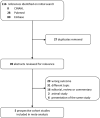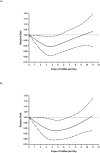Habitual coffee consumption and risk of heart failure: a dose-response meta-analysis
- PMID: 22740040
- PMCID: PMC3425948
- DOI: 10.1161/CIRCHEARTFAILURE.112.967299
Habitual coffee consumption and risk of heart failure: a dose-response meta-analysis
Abstract
Background: There have been discrepant findings on the association between coffee consumption and risk of incident heart failure.
Methods and results: We conducted a systematic review and a dose-response meta-analysis of prospective studies that assessed the relationship between habitual coffee consumption and the risk of heart failure. We searched electronic databases (MEDLINE, Embase, and CINAHL) from January 1966 through December 2011, with the use of a standardized protocol. Eligible studies were prospective cohort studies that examined the association of coffee consumption with incident heart failure. Five independent prospective studies of coffee consumption and heart failure risk, including 6522 heart failure events and 140 220 participants, were included in the meta-analysis. We observed a statistically significant J-shaped relationship between coffee and heart failure. Compared with no consumption, the strongest inverse association was seen for 4 servings/day and a potentially higher risk at higher levels of consumption. There was no evidence that the relationship between coffee and heart failure risk varied by sex or by baseline history of myocardial infarction or diabetes.
Conclusions: Moderate coffee consumption is inversely associated with risk of heart failure, with the largest inverse association observed for consumption of 4 servings per day.
Figures


Comment in
-
Letter by Palatini regarding article, "Habitual coffee consumption and risk of heart failure: a dose-response meta-analysis".Circ Heart Fail. 2012 Nov;5(6):e98; author reply e99. doi: 10.1161/CIRCHEARTFAILURE.112.970111. Circ Heart Fail. 2012. PMID: 23170028 No abstract available.
References
-
- Wilhelmsen L, Rosengren A, Eriksson H, Lappas G. Heart failure in the general population of men--morbidity, risk factors and prognosis. J Intern Med. 2001;249:253–261. - PubMed
-
- Schocken DD, Benjamin EJ, Fonarow GC, Krumholz HM, Levy D, Mensah GA, Narula J, Shor ES, Young JB, Hong Y. Prevention of heart failure: A scientific statement from the american heart association councils on epidemiology and prevention, clinical cardiology, cardiovascular nursing, and high blood pressure research; quality of care and outcomes research interdisciplinary working group; and functional genomics and translational biology interdisciplinary working group. Circulation. 2008;117:2544–2565. - PubMed
-
- Mukamal KJ, Hallqvist J, Hammar N, Ljung R, Gemes K, Ahlbom A, Ahnve S, Janszky I. Coffee consumption and mortality after acute myocardial infarction: The stockholm heart epidemiology program. Am Heart J. 2009;157:495–501. - PubMed
-
- Levitan EB, Ahmed HN, Mittleman MA, Wolk A. Coffee consumption and incidence of heart failure in women. Circ Heart Fail. 2011;4:414–418. - PubMed
Publication types
MeSH terms
Substances
Grants and funding
LinkOut - more resources
Full Text Sources
Medical

